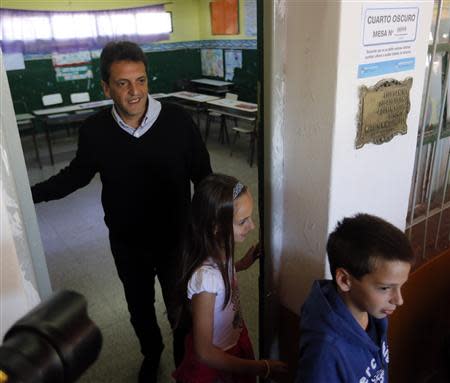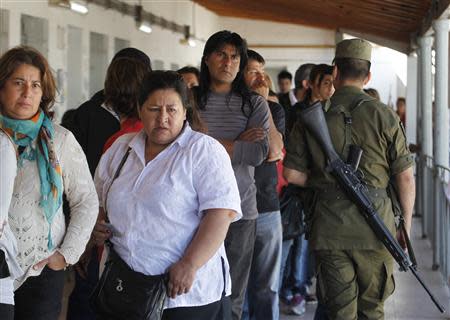Fernandez's allies thumped in Argentina mid-term vote
By Hugh Bronstein BUENOS AIRES (Reuters) - Argentine President Cristina Fernandez's allies took a beating in mid-term elections on Sunday, shrinking her majority in Congress, ending chances of a constitutional change to allow her a third term and kicking off the contest to succeed her in 2015. Voters chose half of the lower house of Congress and a third of the Senate. With 62 percent of ballot boxes counted, the government said the opposition was ahead throughout the country. Re-elected in 2011 on promises of increasing state control in Latin America's No. 3 economy, Fernandez's political coattails were trimmed by inflation, clocked by private analysts at 25 percent. Heavy-handed currency controls and falling central bank reserves have dented confidence in her government. "Seven of every 10 votes cast today went against the government. This election was a triumph for the opposition," said local political analyst Rosendo Fraga. Candidates sponsored by opposition leader Sergio Massa led the House of Deputies' contest by 43 percent to 32 percent in the key province of Buenos Aires, Interior Minister Florencio Randazzo said, citing partial results. Buenos Aires is home to 40 percent of Argentina's voters and most of the country's agricultural output. The loss in this strategic province was expected to shrink the majority that Fernandez's alliance has in Congress to just a few votes. Massa, the mayor of the affluent Buenos Aires town of Tigre, headed his own list of candidates for Congress and is seen as a possible, business-friendly presidential contender in 2015. "Tomorrow, we start with a new political map," said Mauricio Macri, mayor of capital city Buenos Aires and another possible presidential candidate who promises a shift toward market-friendly policies. Sunday's vote also tested the support of other presidential hopefuls. Julio Cobos, a Radical Party member from Mendoza, won his race, as did Hermes Binner, a socialist from Santa Fe. Buenos Aires Governor Daniel Scioli, an ally of the president despite his market-friendly views, campaigned with her candidates and shared in their defeats, his position weakened. Over the months ahead, the jockeying among these potential presidential candidates is expected to increase with financial, grains and energy markets watching for signs of policy changes ahead. At play in 2015 is policy in one of the world's top grains exporters as it struggles to keep up with rising world food demand and attract investment needed to exploit the vast Vaca Muerta shale oil and gas formation in Patagonia. NO THIRD TERM Some legislators had said they wanted a constitutional amendment to allow Fernandez to run for a third term. But the poor showing by her branch of the Peronist party in Sunday's elections dashed those hopes once and for all. To push through the legislation, they would need two-thirds support in both houses. If the exit polls prove accurate, Fernandez would not come close to achieving that level of support for another run for the presidency. She was unable to campaign for her congressional candidates since an October 8 operation to remove blood that pooled on her brain after she fell and hurt her head in August. She is expected to continue convalescing for another few weeks. Speaking to local television, Fernandez's son, Maximo Kirchner, declined to speculate on when his mother would return to work. "She's OK. She's in a good mood," he said. EYES ON MASSA As expected, Massa beat his rival, Martin Insaurralde, Fernandez's handpicked Buenos Aires candidate. Vowing to fight crime, combat inflation and improve farm profits, Massa appears well positioned to run for president. But Argentine history shows mid-term victors are rarely able to sustain momentum and clinch the nomination. A dark horse could appear within the next two years, as was the case with former President Carlos Menem, who burst onto the scene in 1989, and Nestor Kirchner in 2003. Argentina's peso weakened past 10 to the U.S. dollar in informal trade last week, widening its breach with the formal rate of 5.88 pesos per greenback. Central bank international reserves are at $34 billion, down from $43 billion in January. But stocks and bonds have rallied on hopes of market-friendly policy changes ahead. The blue-chip Merval stock index is up nearly 50 percent since a mid-term primary vote on August 12. (Additional reporting by Alejandro Lifschitz; Editing by Kieran Murray and Sandra Maler)






